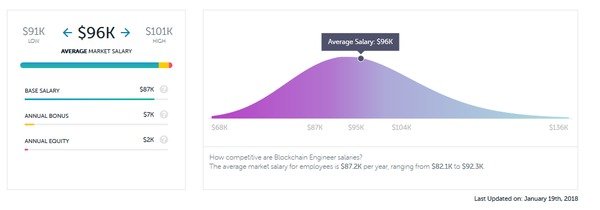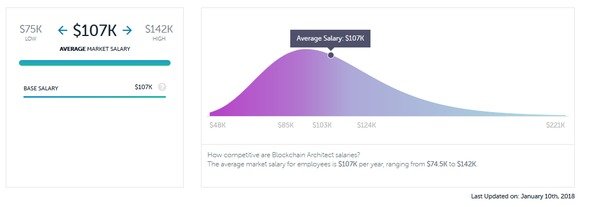It is an interesting time to be a blockchain professional. Even though blockchain technology, by and large, has not found many real-world implementations outside of altcoins yet, the promise of it has proven too much to ignore. The idea of a largely hack-proof data and monetary transferal protocol that has a small footprint and is open-sourced (and is, therefore, free to use) has companies from Accenture to Walmart jumping backward to find a way to use the technology to improve their infrastructure.
As pointed out by John Oliver in a recent episode of "Last Week Tonight," just adding the word "blockchain" to a company's name is enough to average a threefold increase in a company's stock price. This level of interest in blockchain technology leaves many wondering how to leverage it for professional benefit.
For those seeking to get a job in blockchain technology, there is good news and bad news to share about what to expect regarding pay.

Working in Blockchain Tech
To begin, we should take a moment to define "blockchain." Blockchain has been taken to mean anything that can be lumped into a gross classification of the technical underpinnings of bitcoin - that is, the messaging, distribution, and transaction verification protocols that make up the bitcoin network.
This is, of course, not true. A blockchain is a specialized type of distributed ledger in which blocks of altcoins' public keys and transaction registers are stored on publicly shared files. This distinction is important because it helps to explain how the bitcoin and Ethereum's blockchains differ from Walmart's future "blockchain," which would be used to track inventory from suppliers to the store. It is these "privately-implemented distributed ledgers" that are seeing significant growth in hiring.
Per labor market analysis group Burning Glass Technologies, blockchain jobs doubled from 2016 to 2017. The group reported in the last quarter of 2017: "Despite the buzz about the technology, hiring for this skill is still small - but it's growing fast. Blockchain was first developed in 2008. Five years ago, in 2012, we could only find a handful of postings requesting blockchain skills. By 2016, that had increased to 1,838 postings, and so far in 2017, there have been 3,958 postings. That's a 115 percent increase over the 2016 total, and we've barely entered the fourth quarter of the year."
Upwork has found that "blockchain" and "bitcoin" have grown among skills listed by freelancers in 2017. "Freelancers realize how quickly the skills needed are evolving and are the most proactive members of the workforce, reskilling much more frequently than traditional employees,"said Stephane Kasriel, CEO of Upwork and co-chair of the World Economic Forum's Council on the Future of Gender, Education, and Work.
How Much Do Blockchain Workers Make?
The employee empowerment website Paysa argues that most "blockchain" jobs are commensurate with similar computer jobs:
- A blockchain developer makes between $76K and $102K, averaging $89K.

- A blockchain engineer makes between $91K and $101K, averaging $96K.

- A blockchain architect makes between $75K and $142K, averaging $107K.

- A blockchain platform developer makes between $93K and $172K, averaging $131K.
As a point of comparison, a computer programmer makes between $71K and $112K, averaging $91K.
Blockchain is a growing segment of a consistently growing field. There has been a labor shortage in computer sciences since the 1990s, and the growing demand for blockchain technology just confirms this. As Richard Burgess-Kelly said to FinancialNews, if you have the right skillset, you are poised to be successful.
"There's a talent shortage in the network. There's a big shortage in artificial intelligence, machine learning, and blockchain. Due to the nature of supply and demand, salaries for blockchain professionals are rising as well. When you have done a Ph.D. in blockchain, you can make a fortune,"Kelly said.
The world of New Finance opens up opportunities to investors and workers alike. Want to know more? Sign up for the Bitcoin Market Journal investor newsletter and have the latest topics in New Finance delivered weekly!
Interesting for those who have saved enough for such days I guess. Thank you for good content and for the information.